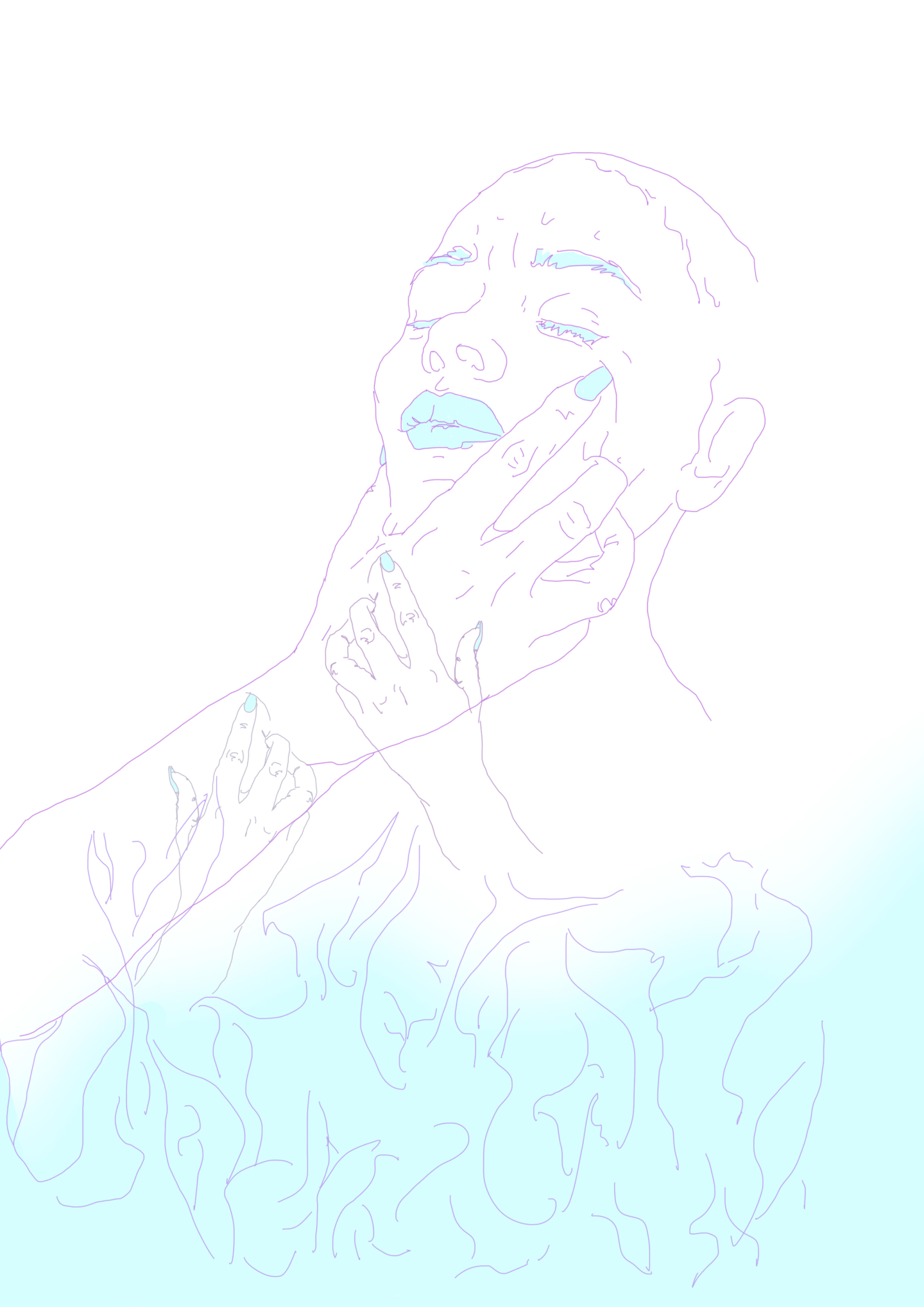On The Realities Of Being A Black Woman With Borderline Personality Disorder
An excerpt from Do What You Want, a new U.K. zine about mental health.
 Illustration taken from Do What You Want
Mariel NO
Illustration taken from Do What You Want
Mariel NO
On April 28, the world of DIY publishing will get a stellar new addition with Do What You Want, a one-off U.K. zine about mental health and wellbeing. It's the work of author and food writer Ruby Tandoh, who's edited the publication with her long-term partner Leah Pritchard. Contributors include actress Mara Wilson, Tejal Rao of The New York Times, and Tandoh herself. “We wanted the stories, and the tellers of those stories, to be a diverse as possible,” said Pritchard in a press release. “Mental illness can affect anyone, and we wanted the zine to reflect that.” Read on for an excerpt by U.K. writer Christine Pungong, and pre-order the zine here — all proceeds will be donated to charities Mind, Beat, Sisters Uncut, and more.
I’ve never seen my mother cry. When I was younger I came to the conclusion that she was cold, but with time I realized this simply wasn’t true. I know my mother is emotional: I’ve seen her joyful, I’ve seen her furious, I’ve seen her excited and scared and even sad, I’ve just never seen her cry. I later grew up to understand that we live in a world that doesn’t grant black women vulnerability — and that black women everywhere suffer for it immeasurably. It is for this exact reason that I couldn’t admit to myself that I was ill for a very long time. I associated vulnerability with weakness, and as Ghanaian-American writer Meri Nana-Ama Danquah writes in her memoir Willow Weep For Me: A Black Woman’s Journey Through Depression, “weakness in black women is intolerable.” In a way, that’s what made my Borderline Personality Disorder an even more terrifying diagnosis — emotional instability is not in the black girl repertoire.
Borderline Personality Disorder, or BPD, is characterised by unstable emotions and relationships, impulsivity, self-harming behaviour, and disturbed thought processes. BPD has always been a complex and controversial diagnosis amongst clinicians. Some (like my old psychiatrist) even refuse to refer to it as a mental illness, and instead acknowledge it only as “a series of maladaptive behavioural patterns.” These people, regardless of who they are, are terribly misinformed.
Unlike anxiety or depression, it’s not so easy to pinpoint any exact things that I do, or think, and attribute them to having BPD. It influences every aspect of my life and my reality. It affects all of my actions, interactions, and relationships. It also means I spend a lot of time worrying about how I can ever separate myself from it. What parts of my personality are me as an individual and what parts are just the pathology? Are they one and the same? When your identity is constructed around an illness, you can’t help but ask yourself: who am I without it?
For a long time, I thought that a personality disorder was a life sentence, when in fact many BPD patients achieve either full or partial remission within 10 years. Sometimes that feels too long to keep pushing for. At other times it gives me something to strive towards. While it’s been clear to me that I’ve had BPD since the age of 15, I only pushed for an official diagnosis a year ago, when I was positive that I had the physical and mental energy to confidently discuss and advocate for my own health. I already knew from the experiences of friends and family that maneuvering the mental health system as a black woman was tough. You are gaslighted, patronised, ignored, or just completely forgotten about. But still, I naively anticipated that the aftermath of my official diagnosis would bring a wave of relief, comfort, and reassurance. I eagerly awaited the peace of mind. It never came.
The first time I approached a doctor with the idea that I might have BPD, he told me that if I thought I had it then it was most likely that I didn’t. For good measure he felt the need to add that BPD patients were often difficult, stubborn, and untreatable, and he didn’t think I was any of those things. I remember being shocked, if not disturbed at his antipathy; little did I know of the stigma that would await me post-diagnosis. Hospital staff don’t treat you with quite the same care or attentiveness as other patients, GPs refuse to offer you certain medication, nurses audibly sigh when they read your file. Despite being medical professionals, none of them even try to hide their distaste. The internet doesn’t prove to be any more reassuring. The first time I Googled BPD I was bombarded with pages and pages of unwarranted stigma and abuse. Articles on how awful and manipulative those with BPD are, and forums with tips on how to avoid us.
 Illustration taken from Do What You Want
Mariel NO
Illustration taken from Do What You Want
Mariel NO
A lot of BPD stigma stems from the fact that its symptoms aren’t as palatable or acceptable as people would like them to be. They exceed the limits of a lot of people’s so-called sympathy and compassion for mental illness. While in recent years mental health awareness has boomed, all that’s really happened is that stigma has shifted from what are now slightly better understood conditions like anxiety and depression, to the less pleasant ones — meaning personality disorders, psychotic and dissociative disorders, bipolar disorder, and so on. Statistics show that seven in every thousand people in the U.K. have BPD. Why are we still treated like we are undeserving of care?
Being a black woman adds an intense extra dimension to that. Healthcare in Britain is both racialized and gendered, and yet many mental health professionals who I have met seem to find it difficult to comprehend the role racism and sexism can have in causing and worsening certain mental illnesses.
Sometimes I’m aware of my illness being almost political. The anguish and suffering of black women is fetishised only when it’s in sacrifice. Historically, the value of black womanhood has rested on our ability to endure pain in silence. Black women are martyred for their ability to silently withstand the violence and injustice enacted upon them; apparently it is what makes us divine. The harm this does to the mental health of black girls everywhere is traumatic.
A study published in the British Journal of Psychiatry in 2010 that was conducted in the emergency rooms of three U.K. cities showed that young black women were the demographic most at risk for self-harm. There’s no way to turn that into poetry. At this point in my life I empathize with my mother more than ever. I recognise now that she was probably never even given the space she needed to cry. Did anyone ever think to ask her: "Are you okay? What has happened to you? What are the ways in which I can help you heal?" More than anything I want my mother to be free from this burden of false strength.
“The greatest thing I can do for myself in a world that invalidates my experiences, identity, and existence is to love myself fiercely, and care for myself as best as I can”
With this in mind, I refuse to feel selfish for devoting my undivided care and attention to myself. I refuse to feel selfish for talking unashamedly about my illness. I repeat those two sentences to myself every single day. It is an act of political warfare to put myself first.
Having a complex mental health history sometimes feels like I’m carrying around some sort of secret. You’ll find “when is the right time to tell the person you’re dating that you have a personality disorder?” in my recent Google search history. I once dated someone who insisted, without any prior knowledge of what BPD actually was, that it had probably helped me become a better person and that without it I “probably wouldn’t have as many accomplishments.” They saw my BPD as abstract, as something exotic and alluring, rather than debilitating and exhausting. Needless to say, we didn’t last very long. The fetishization of mentally ill people is nothing new. Society loves that particular vulnerability that comes with madness.
What that means, though, is that mentally ill people, particularly mentally ill women and non-binary/gender non-conforming people, have a disproportionately higher risk of being subjected to violence and abuse. Most of the time, the admission of my mental illness doesn’t even come from my mouth — my wounded skin reveals all my secrets. The scars I have from self-harm are the residue of my most difficult moments. They imply tragedy. They suggest violence, trauma, pain. Even harder than accepting this is realizing that most of the time I don’t even feel safe in the one place I should be able to take refuge — my own body. I rightly refuse to allow others to weaponize my body against me, but I don’t know how to stop doing it to myself.
Though I try to resist it, I sometimes get the urge to self-sabotage purely out of rebellion. In a diary entry from over a year ago I had written: “I wish I could be sicker in scarier and more dangerous ways, so then at least people would take me seriously.” Of course this isn’t true, but at the time it made perfect sense. In a world that doesn’t give me the space to be in pain, let alone listen to why or affirm it, surely the greatest thing I could do is deteriorate, and make a spectacle of it too — do it loudly and violently and in protest. I know now that the exact opposite is true.
The greatest thing I can do for myself in a world that invalidates my experiences, identity, and existence is to love myself fiercely, and care for myself as best as I can. I know this, but it feels devastatingly difficult to put into practice. How do I love myself when I’m not sure that I even like myself? Prioritising my self-preservation over self-destruction is my first simple step. Each new day I am learning to take it from there.
